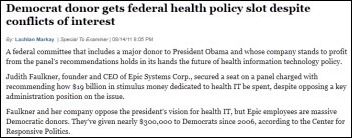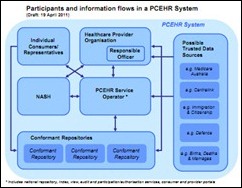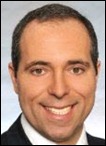Giving a patient medications in the ER, having them pop positive on a test, and then withholding further medications because…
News 8/17/11
Top News
![]() The VA has been on-again, off-again on whether it will build or buy a replacement for its VistA system, but former deputy CIO Ed Meagher says the VA and DoD may pay companies billions to write a new open source system. He now works for CSC, one of the contractors hoping to get the VA’s business. I knew the VA recently issued a $5 million contract to create an open source community for the VistA replacement and had previously announced plans to go that route, but I haven’t heard a definitive final word, especially when a group of Epic-friendly politicians is pushing the VA to look at commercial systems. The article’s choice of experts to quote about vendor products is questionable: Allscripts has done a great job creating an open architecture platform (according to an investment firm analyst who just put a Buy rating on MDRX shares) and GE Healthcare could work well in the VA’s environment (according to a government sales guy from GE Healthcare).
The VA has been on-again, off-again on whether it will build or buy a replacement for its VistA system, but former deputy CIO Ed Meagher says the VA and DoD may pay companies billions to write a new open source system. He now works for CSC, one of the contractors hoping to get the VA’s business. I knew the VA recently issued a $5 million contract to create an open source community for the VistA replacement and had previously announced plans to go that route, but I haven’t heard a definitive final word, especially when a group of Epic-friendly politicians is pushing the VA to look at commercial systems. The article’s choice of experts to quote about vendor products is questionable: Allscripts has done a great job creating an open architecture platform (according to an investment firm analyst who just put a Buy rating on MDRX shares) and GE Healthcare could work well in the VA’s environment (according to a government sales guy from GE Healthcare).
Reader Comments

![]() From Too Big for my Breaches: “Re: yet another data breach. I’m getting tired of hearing about these.” St. Francis Hospital (DE) apologizes for a doctor’s loss of a thumb drive containing information on 474 maternity patients. He lost it in the spring, but someone mailed it back to him on June and he didn’t report it until then, pushing the hospital’s 60-day deadline to report the loss. The doctor was authorized to copy the information but violated hospital policy by not encrypting the drive. He must have been researching old cases — the hospital says the in utero babies whose records he copied are now nine or 10 years old.
From Too Big for my Breaches: “Re: yet another data breach. I’m getting tired of hearing about these.” St. Francis Hospital (DE) apologizes for a doctor’s loss of a thumb drive containing information on 474 maternity patients. He lost it in the spring, but someone mailed it back to him on June and he didn’t report it until then, pushing the hospital’s 60-day deadline to report the loss. The doctor was authorized to copy the information but violated hospital policy by not encrypting the drive. He must have been researching old cases — the hospital says the in utero babies whose records he copied are now nine or 10 years old.
![]() From Victory at Sea: “Re: UAB. I believe that most people in healthcare are honest and want to help people, but there’s a lot of money rolling around inside these organizations (vendors too) and temptation is always to be found for those who are open to it.” The FBI launches an investigation into Alabama’s only organ donation center, UAB-run Alabama Organ Center, after discovering that its director and associated director had an “improper financial relationship with a vendor.” UAB has fired the employees and parted ways with the unnamed vendor.
From Victory at Sea: “Re: UAB. I believe that most people in healthcare are honest and want to help people, but there’s a lot of money rolling around inside these organizations (vendors too) and temptation is always to be found for those who are open to it.” The FBI launches an investigation into Alabama’s only organ donation center, UAB-run Alabama Organ Center, after discovering that its director and associated director had an “improper financial relationship with a vendor.” UAB has fired the employees and parted ways with the unnamed vendor.
![]() From TxPathDr: “Re: Jason Dufner. Anyboy else notice that he had a Greenway Medical logo on his chest for the PGA tournament in Atlanta this week? I can’t remember ever seeing an EMR company logo on a golfer before.” Greenway struck a deal a few weeks back to have him wear their logo and be available for marketing and company-sponsored events. The green logo really pops on his pink shirt.
From TxPathDr: “Re: Jason Dufner. Anyboy else notice that he had a Greenway Medical logo on his chest for the PGA tournament in Atlanta this week? I can’t remember ever seeing an EMR company logo on a golfer before.” Greenway struck a deal a few weeks back to have him wear their logo and be available for marketing and company-sponsored events. The green logo really pops on his pink shirt.
![]() From A CEO: “Re: our interview. Questions I get from healthcare trade rags and the financial press are vanilla – my sense is the editors / journalists are just trying to get their stories written vs. trying to arrive at insights relevant to their readership. I found your questions intellectually stimulating. Keep doing what you are doing – we appreciate it.” Thanks, both for doing the interview and for the nice words. I don’t like asking stupid questions, at least when I can help it, so I treat my interviews as a conversation. As in most conversations, not everybody is fascinated by every interview of the hundreds I’ve done – it depends on their area of interest. As for me, everybody I’ve interviewed has taught me something.
From A CEO: “Re: our interview. Questions I get from healthcare trade rags and the financial press are vanilla – my sense is the editors / journalists are just trying to get their stories written vs. trying to arrive at insights relevant to their readership. I found your questions intellectually stimulating. Keep doing what you are doing – we appreciate it.” Thanks, both for doing the interview and for the nice words. I don’t like asking stupid questions, at least when I can help it, so I treat my interviews as a conversation. As in most conversations, not everybody is fascinated by every interview of the hundreds I’ve done – it depends on their area of interest. As for me, everybody I’ve interviewed has taught me something.
![]() From Bruce Werner: “Re: interview with our CEO, Mark Debnam. The HIStalk interview was a big success. Our Facebook ‘likes’ jumped significantly. We are proud to be part of the HIStalk family.” Mark of Quality IT Partners and I are both progressive music nerds, so we were nearly breathless in discussing the latest tours and albums from Yes and Asia, which I omitted from the interview transcript since, puzzlingly, not everybody is a fanboy for semi-obscure bands whose heyday was a couple of generations ago.
From Bruce Werner: “Re: interview with our CEO, Mark Debnam. The HIStalk interview was a big success. Our Facebook ‘likes’ jumped significantly. We are proud to be part of the HIStalk family.” Mark of Quality IT Partners and I are both progressive music nerds, so we were nearly breathless in discussing the latest tours and albums from Yes and Asia, which I omitted from the interview transcript since, puzzlingly, not everybody is a fanboy for semi-obscure bands whose heyday was a couple of generations ago.
![]() From Chillicothe: “Re: Epic. Wondering if you saw this?” Several readers sent over a link to that story in The Examiner, a free, conservative DC-area newspaper. It’s all rehash: Judy Faulkner of Epic was appointed to the HIT Policy Committee and Epic employees have given $300K to Democrats since 2006 (doesn’t sound like much for a company of that size). Surely nobody’s shocked that donors get some reciprocal back-scratching, like being appointed, but her spot was set aside as a vendor rep, so why not her? The article takes a somewhat slanted position that Epic isn’t open to interoperability (the article’s one quoted source to back that statement – CEO Glen Tullman of Epic competitor Allscripts, who is himself a lot better connected politically than Judy will ever be). The rag finds a hidden Obama agenda — the examples he’s given of well-run hospitals (Geisinger, Kaiser, Cleveland Clinic, and Mayo) are all Epic customers. One thing I might agree with: it would indeed be a bit suspicious if Epic got the VA’s bid (which doesn’t seem to be happening, at least at this moment) but otherwise, they’re getting plenty of business without government help. And yes, the Obama administration was mighty generous with our money in bribing providers to use EMRs they weren’t spending their own money on.
From Chillicothe: “Re: Epic. Wondering if you saw this?” Several readers sent over a link to that story in The Examiner, a free, conservative DC-area newspaper. It’s all rehash: Judy Faulkner of Epic was appointed to the HIT Policy Committee and Epic employees have given $300K to Democrats since 2006 (doesn’t sound like much for a company of that size). Surely nobody’s shocked that donors get some reciprocal back-scratching, like being appointed, but her spot was set aside as a vendor rep, so why not her? The article takes a somewhat slanted position that Epic isn’t open to interoperability (the article’s one quoted source to back that statement – CEO Glen Tullman of Epic competitor Allscripts, who is himself a lot better connected politically than Judy will ever be). The rag finds a hidden Obama agenda — the examples he’s given of well-run hospitals (Geisinger, Kaiser, Cleveland Clinic, and Mayo) are all Epic customers. One thing I might agree with: it would indeed be a bit suspicious if Epic got the VA’s bid (which doesn’t seem to be happening, at least at this moment) but otherwise, they’re getting plenty of business without government help. And yes, the Obama administration was mighty generous with our money in bribing providers to use EMRs they weren’t spending their own money on.
![]() From The PACS Designer: “Re: Toodledo. Will Weider of Candid CIO blog fame recently posted about a to-do listing app called Toodledo. You can get Toodledo versions for your mobile phone, as well as an app to add it to your e-mail, on your calendar, and integrate it directly into your web browser.” I’d be interested if it does recurring events and reminders. I don’t use Outlook at home and I’m finding Google Calendar to be pretty sucky when it comes to reminders. In fact, I’m becoming slowly annoyed at most things about Gmail and Google Docs – the spare design was cute at first, but everything feels clunky and I still don’t like the “conversation” design of Gmail since I’m always deleting entire message threads by mistake.
From The PACS Designer: “Re: Toodledo. Will Weider of Candid CIO blog fame recently posted about a to-do listing app called Toodledo. You can get Toodledo versions for your mobile phone, as well as an app to add it to your e-mail, on your calendar, and integrate it directly into your web browser.” I’d be interested if it does recurring events and reminders. I don’t use Outlook at home and I’m finding Google Calendar to be pretty sucky when it comes to reminders. In fact, I’m becoming slowly annoyed at most things about Gmail and Google Docs – the spare design was cute at first, but everything feels clunky and I still don’t like the “conversation” design of Gmail since I’m always deleting entire message threads by mistake.
Acquisitions, Funding, Business, and Stock
Intermedix, a provider of RCM services for emergency healthcare services, buys the assets of RCM-provider Comprehensive Medical Billing Solutions of Oklahoma City.
Axiom Systems acquires Ivertexo Internet Solutions, a provider of administrative software solutions for healthcare providers.
MedQuist Holdings announced Q2 numbers Tuesday morning: revenue flat, EPS $0.11 vs. -$0.06. Its acquisition of M*Modal gets clearance to be completed in August. MedQuist shares made the list of biggest Nasdaq losers Tuesday, down 18%. The company says it’s pushing more work offshore, but is being negatively impacted by customers sending work offshore themselves, by customers using speech recognition instead of transcription (which I’m sure is why they are buying speech recognition provider M*Modal for $130 million) , and by providers focusing on EHRs.
Vocera files SEC paperwork for its $80 million IPO.
Sales
Cooper County Memorial Hospital (MO) will spend $2.5 million for Meditech, which it selected over Cerner and Healthland. Hospital CEO Allen Waldo says, “Meditech won the contract because the hospital’s clinicians thought it was more user-friendly and had a better data recovery system.”
The VA awards ICS Nett and Beacon Enterprise Solutions Group a $3.4 million contract to provide the management and installation of an RTLS solution for tracking equipment, supplies, implants, and surgical instruments.
St. Joseph’s Medical Center (CA) selects PerfectServe’s voice, mobile, and Web-based clinical communications system.
The Australian government chooses a consortium of eight firms to participate in the infrastructure build of its $466.7 million personally controlled electronic health record (PCEHR). Winners include Accenture ($47.8 million), Oracle ($17.8 million), and Orion Health ($11 million) along with sub-contractors Telstra, Cerner, ThinkPlace, Extensia, and Ocean Informatics.
People
Lehigh Valley Health Network promotes Donald L. Levick, MD, MBA to CMIO.
Former McKesson Health Solutions CFO and VP Peter P. Csapo will join VHA as CFO.
Beebe Medical Center (DE) names Jeffrey Hawtof, MD VP of medical operations and informatics.
Kevin Groskreutz is promoted to CIO of Hospital Sisters Health System Western Wisconsin.
Bassett Healthcare (NY) names Scott Groom VP/CIO. He was previously with Cabell Huntington Hospital (WV).
Announcements and Implementations
Resurrection Health Care (IL) goes live on its system-wide Epic implementation with the activation of billing and scheduling at 20 ambulatory care clinics. The practices will add EMR over the next six to eight months; the first of six hospitals will begin go-lives in the fall.
Zynx Health announces two enhancements to its clinical decision support technology: Workflow Management to streamline content development and Export Validation to allow Cerner CPOE users to validate order sets before exporting them.
Vital Images / Toshiba gets 510(k) clearance for its VitreaView browser-based universal patient imaging viewer, which allows EMR and HIE users to view all patient images. It was announced in June.
Government and Politics
![]() President Obama announces new economic initiatives to spur growth and create jobs in rural areas, including loan programs to enable hospitals to purchase HIT. The administration also announces a loan repayment program for more than 1,300 small, rural hospitals to recruit new physicians. The White House estimates that the addition of one new primary care physician in a rural community generates $1.5 million in annual revenue and creates 23 jobs annually.
President Obama announces new economic initiatives to spur growth and create jobs in rural areas, including loan programs to enable hospitals to purchase HIT. The administration also announces a loan repayment program for more than 1,300 small, rural hospitals to recruit new physicians. The White House estimates that the addition of one new primary care physician in a rural community generates $1.5 million in annual revenue and creates 23 jobs annually.
FDA will hold a public workshop seeking input on what types of mobile medical applications it should regulate on September 12-13 in Silver Spring, MD. This follows FDA’s July draft guidance on that topic.
Other
![]() A proposed compost facility in Freetown, MA is stinking up Meditech’s plan to develop a new office building that could bring 800 jobs to the area. The city is looking into the issue.
A proposed compost facility in Freetown, MA is stinking up Meditech’s plan to develop a new office building that could bring 800 jobs to the area. The city is looking into the issue.
![]() CEO compensation at Boston’s nonprofit teaching hospitals is leveling off, with 2009 pay equal to or less than the previous year’s. Elaine S. Ullian, the former CEO of Boston Medical Center experienced one of the biggest declines: $1.8 million in 2009 compared to $4.8 million in 2009.
CEO compensation at Boston’s nonprofit teaching hospitals is leveling off, with 2009 pay equal to or less than the previous year’s. Elaine S. Ullian, the former CEO of Boston Medical Center experienced one of the biggest declines: $1.8 million in 2009 compared to $4.8 million in 2009.
About 40% of EDs in urban areas e-prescribe compared to just 6% in rural areas.
![]() I’m loving the site (sites, actually: this one and this one) of Atlanta anesthesiologist Michelle Au MD, author of This Won’t Hurt a Bit (And Other White Lies): My Education in Medicine and Motherhood. She’s darned funny, describing her book as: “It contains ‘pages’ and ‘words.’ I done wrote it.’” But if you’re on the fence as to whether she’s wickedly humorous, click the graphic above to enlarge. Brilliant. I think I’ll buy the book.
I’m loving the site (sites, actually: this one and this one) of Atlanta anesthesiologist Michelle Au MD, author of This Won’t Hurt a Bit (And Other White Lies): My Education in Medicine and Motherhood. She’s darned funny, describing her book as: “It contains ‘pages’ and ‘words.’ I done wrote it.’” But if you’re on the fence as to whether she’s wickedly humorous, click the graphic above to enlarge. Brilliant. I think I’ll buy the book.
![]() Vince Ciotti (and I) would approve: McKesson joins The IT History Society as a corporate member.
Vince Ciotti (and I) would approve: McKesson joins The IT History Society as a corporate member.
![]() Another highly paid non-profit hospital CEO: the head of a 326-bed Brooklyn hospital made $4 million in 2009 while laying off employees and closing clinics that served its predominantly Medicaid patient population. The board gave the usual “market rate” excuse.
Another highly paid non-profit hospital CEO: the head of a 326-bed Brooklyn hospital made $4 million in 2009 while laying off employees and closing clinics that served its predominantly Medicaid patient population. The board gave the usual “market rate” excuse.
Sponsor Updates
- Memorial Sloan-Kettering Cancer Center (TX) signs an enterprise license agreement for iSirona’s device connectivity solution.
- Canterbury District Health Board (NZ) partners with Orion Health to provide secure access to patient information.
- Capsule is exhibiting at this month’s Allscripts Client Experience 2011.
- Capario launches a new Web site, blog, and social media presence on Twitter, Facebook, and LinkedIn.
- Scott Besler of Besler Consulting will discuss New Cost Report Changes at next month’s HFMA NJ’s quarterly meeting.
- NextGen announces a webinar and live demo for its digital pen solution, NextPen.
- MedPlus will exhibit at Epic’s 2011 Users’ Group Meeting in September.
- Practice Fusion’s Research Division releases a list of most-prescribed drugs, derived from its EMR database.
- The 25-bed critical access hospital Lakewood Health System (MN) selects McKesson’s Paragon HIS.
- Billian’s HealthDATA publishes a white paper called Providers’ Perceptions: Mobility in Healthcare.
- Eisenhower Medical Center (CA) contracts with Wolters Kluwer Health for its ProVation gastroenterology procedure documentation and coding software.
- The healthcare business of Thomson Reuters introduces Payment Reform Solutions to help hospitals adopt new payment methodologies.
- Kyle Swarts joins Culbert Healthcare Solutions as a regional sales executive.
- The District of Columbia Primary Care Association subscribes to CapSite’s online service, giving its network of providers the ability to identify technology pricing and packaging options.
- Kareo hires James Mathews its first VP of business development. He has worked for Sage Healthcare, Carefx, and WebMD.
- GE Healthcare will launch Centricity Business 5.0 at next week’s Centricity Business National Users’ Conference in Boston.
Contacts
Mr. H, Inga, Dr. Jayne, Dr. Gregg.






















Todledoo is great with recurring tasks. Every Monday morning I wake up to a reminder to record my project time and every other Monday I am reminded to approve time cards.
Re: Michelle Au’s “The 12 Medical Specialty Stereotypes” – Hilarious!!!!
You can turn off conversation mode in Gmail now. Settings -> Mail Settings -> Conversation View (On, Off)
[From Mr. H] Thanks for the info. Done!
Similar to Toodledoo is reQall and Evernote. Two applications that have made me paperless and organized via all devices. reQall does excellent voice to text, the reminders are great and synce with any device and can be specific by where you are at (location/gps)… Evernote has basically digitized anything that I have paperbase.. Think personal imaging system with the search and usability of iTunes. Wouldn’t live without either.
Obama is announcing a new initiative to spur growth and create jobs…???
Oh puleeeze
One more ToDo app that I have settled on after using all of the above.Producteev https://www.producteev.com/
It rocks. Nice interface, integration with Outlook and Google everything.
TPD will be adding Toodledoo, reQall, and Evernote to the next update of TPD’s List of iPhone Apps. Thanks for the input on these apps!
Vehemently disagree with your note: …Yes and Asia… puzzlingly, not everybody is a fanboy for semi-obscure bands whose heyday was a couple of generations ago.
Who are these non-fans of Yes and Asia?
Mayo is an Epic customer? Arizona had the billing app, but I thought that was deinstalled. Otherwise it is Cerner/GE.
Similar response to MNViking, but I thought the Mayo EMR was mostly home-grown.
RE: “Epic employees have given $300K'”.
Judy personally accounts for roughly 85% of those donations. Other vendor executives also donate large sums…the difference is that she has been appointed to an important government committee that will help decide how tax dollars are spent on technology that her company happens to sell. As such many people feel, with reason, there may be a conflict of interest.
http://www.opensecrets.org/index.php
Thank you SO much for the Michelle Au links! Duly bookmarked.
Once you get use to threaded messages in Google, you’ll miss it. They save my inbox. You just need to enable the google labs that lets you delete messages from a certain email on.
Tom Munnecke had some good posts a few months back regarding the VA decision and the potential impact of Epic’s political donations, etc. I respect his insight on this, not just as an advocate for open source software, but as someone who has worked at the VA and on VistA since its inception. Whether or not one thinks Epic’s political donations are significant, I agree with Munnecke’s sentiment:
“Vendors want proprietary solutions to lock in the government to their systems. They are happy to low-ball the bid, knowing that they can make it all back in change orders later when the government is helpless (or sometimes, unwilling) to resist paying exorbitant prices for the simplest of tasks.” He continues, “Setting things up for rich corporations to make big campaign contributions to politicians who then meddle in departmental decisions is a path to ruination, not a successful system. Competition should be for who provides the best software, not who makes the largest political campaign contributions.”
It is obviously in Epic’s best interest to try and lock in the govt to its system. Given that Judy Faulkner holds a position on a govt committee that can influence such decisions, which have wider ranging impact, I think it’s right to be vigilant in pointing out potential conflicts of interest. No harm can come from healthy scrutiny. As another commenter noted, Allscripts CEO is also very politically connected. So are key industry figures such as Kaiser CEO George Halvorson (also an an Epic customer). They all have their interests. With so much attention on health care IT as a political issue today, the potential is that much greater for money and politics to have *too much* influence over govt policy decisions that may ultimately impact all of our lives. Ideally, I’d like to see govt committee members take the initiative themselves to NOT make political donations, but I realize that’s totally unrealistic.
http://munnecke.com/blog/?p=1041
http://munnecke.com/blog/?p=906